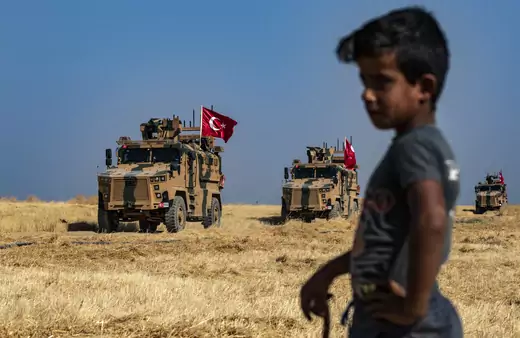By Steven A. Cook
President Donald J. Trump’s announcement of a troop withdrawal in northern Syria ahead of a Turkish invasion could revive the Islamic State and the Syrian civil war, and signal the end of U.S. influence there. U.S. troops have begun pulling back from the northeastern Syria-Turkey border. What’s going on?
President Trump has long wanted to withdraw from Syria. He believes it is the responsibility of local actors to work out their geopolitical and security problems. Because Trump has declared the defeat of the self-proclaimed Islamic State, he sees no reason for U.S. forces to remain there. Turkish President Recep Tayyip Erdogan has sought to convince Trump, most recently in a phone call on October 6, that there is no longer a need for the United States to be in northeastern Syria because the Islamic State is no longer a major threat. As a result, the United States no longer needs a security relationship with the Syrian Kurdish forces known as the People’s Protection Units (YPG). This group has been instrumental in the fight against the Islamic State and currently holds a reported ninety thousand of the group’s fighters and families in makeshift prisons. The YPG is directly linked to the Kurdistan Workers’ Party (PKK), which has been waging a war on Turkey since the 1980s.
It seems that U.S. officials believe that by abandoning the YPG and giving Turkey a green light to move into Syria, they will also prove that Washington takes Ankara’s security concerns seriously and, in the process, can drive tension between Turkey and Russia. Thus, Syria—a source of great strain between Americans and Turks—can now be the place from which to rebuild the strategic relationship. But this does not take into account the fact that Erdogan and other top Turkish leaders have determined that the kind of close relations that the United States and Turkey once had are no longer in Ankara’s interests. Given the past pattern of relations, the Turks will likely pocket U.S. goodwill and pursue their interests regardless of U.S. concerns.
The YPG make up a significant portion of the Syrian Democratic Forces (SDF), which have been the primary ground forces in the fight against the Islamic State. The U.S. withdrawal will now expose the YPG to a greatly superior Turkish military. However, a Turkish incursion is risky. Despite the overwhelming strength of the Turkish armed forces, they could get stuck in Syria fighting a determined enemy who uses asymmetric warfare.
The SDF, which also includes Arab and ethnic Turkmen militias, has been guarding Islamic State fighters and their families in makeshift prisons. A Turkish invasion will make it harder to hold those prisoners because the YPG contingents of the SDF will likely fight Turkey.
Trump’s decision to withdraw from Syria based on his estimation that the Islamic State has been defeated may very well give the group an opportunity to reemerge as a major threat. It is already clear that it is regrouping, remains ideologically committed, and its leadership remains intact.
Syria’s civil war is now entering a new phase. It is not a leap to expect Syrian President Bashar al-Assad’s regime to support the YPG in any fight against Turkish forces. Anyone who believed that the end of this conflict was near should reevaluate that position.
U.S. policy in Syria has been unpredictable under Trump. Is it possible that U.S. forces will retain their hold in the region or that European allies will play a stepped-up role?
It is unlikely that U.S. forces will retain a hold in Syria. The president believes that local actors should handle local problems and since—again, in his view—the Islamic State has been defeated, there is no need for U.S. forces to be in Syria. It seems equally unlikely that the Europeans will step up as the United States steps down. U.S. officials have had a hard time convincing their European counterparts to join U.S. forces in Syria precisely because Washington has been unpredictable.
Does this announcement indicate a tightening of U.S.-Turkish ties?
This is the desire of some on the U.S. side. There are officials in the White House, the State Department, and Department of Defense who believe that the United States is better off in the world with Turkey as a strategic partner. As a result, they have wanted to get rid of the major problem in the relationship, which is U.S. support of the YPG. The withdrawal of U.S. forces is the result of that approach.

No comments:
Post a Comment